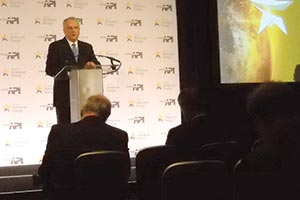Oil Group Campaigns to Roll Back Rules In First 100 Days of Trump Presidency

This story appears in the Jan. 9 print edition of Transport Topics.
WASHINGTON — The American Petroleum Institute will pursue an aggressive policy agenda during the first 100 days of the incoming administration of President-elect Donald Trump and his four-year term, the trade group’s president said here during the organization’s annual State of American Energy event.
Jack Gerard said in a speech Jan. 4 followed by a question-and- answer period, that the U.S. oil and natural-gas industry he represents has made strong contributions to the nation’s environment, consumers and employment rolls and that while regulation has its place, rules should be written in a “smart, common-sense” fashion.
He several times avoided the debate over being “a believer or a denier” of man-made contribution to climate change but cited figures from the U.S. Energy Information Administration and said that “in the first six months of 2016, carbon emissions from electricity generation were at their lowest point in 25 years, even as electricity demand continues to rise, due largely to greater use of natural gas — now our nation’s largest fuel source for electricity.”
He also credited highly refined petroleum products — such as ultra-low-sulfur diesel with no more than 15 parts per million of sulfur — for helping to clean up the air, adding that American refineries should be encouraged to export such commodities to other nations so they can benefit from “clean-burning American fuels.”
Gerard spoke to members of Congress, other lobbyists, union leaders and reporters. He told them that oil and gas companies are eager to invest billions of dollars in private investment to expand energy production and distribution facilities, which would lead to more jobs and more energy — all with a possible spillover benefit for trucking.
He did not talk about predictions for petroleum pricing, but he did argue for allowing oil and gas companies to increase U.S. production supplies.
“For the first time in our lifetime, we can now say that North America has the potential to become a net energy exporter. That’s a revolutionary change, a significant shift from where we were just a few short years ago,” he said.
Gerard also said he would like to see more policies made by Congress rather than through regulators. He also called for “respect for the rule of law,” saying that permitting and environmental review processes should not extend without limit.
“Once an issue has been considered and a final decision has been made, we should honor that decision,” he said.
Gerard also took issue with the Environmental Protection Agency’s renewable fuel standard, or RFS, which sets mandatory minimums for alternative fuels such as ethanol to go with gasoline and biodiesel to be blended with conventional diesel.
The API report that accompanied his speech said the RFS levels are too high compared with what consumers actually want. Gerard said RFS should be repealed or undergo a major restructuring.
Gerard and the API report also touched on world energy needs.
The report said India has 244 million people without electricity, making for a national electrification rate of 81% but with a wide range of usage by geography. Urban India has a 96% electrification rate, but it is 74% in rural areas.
In Africa, the report said, 634 million people are without electricity, meaning a continentwide electrification rate of 45%, rising to 71% in urban areas but 28% in rural places.
The report suggests the United States as a major candidate to fill global energy needs. Using EIA figures, it said U.S. refinery capacity is 18.44 million barrels a day, highest in the world.
China takes second place with a capacity of 11.19 million barrels a day. Russia is a distant third with a capacity of 5.74 million barrels a day.




